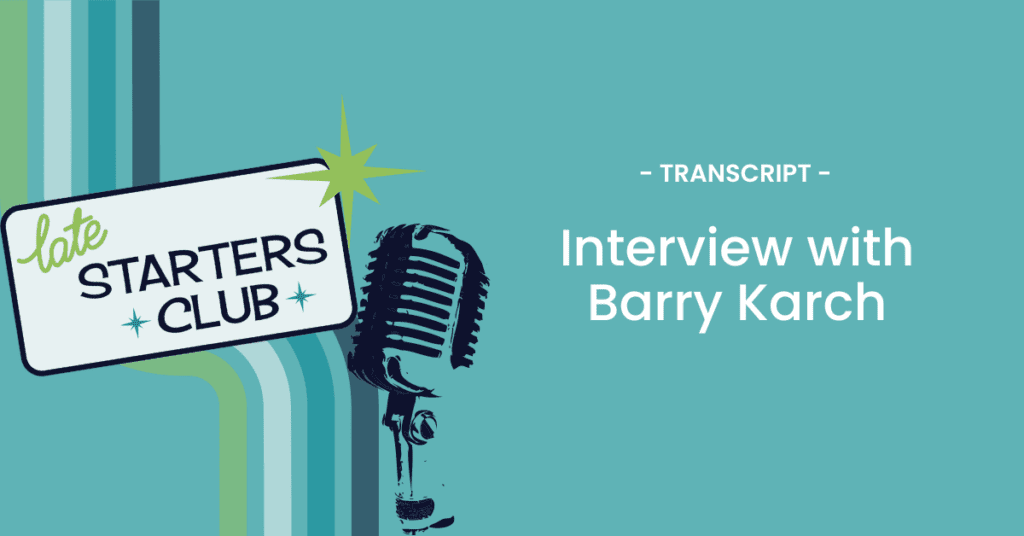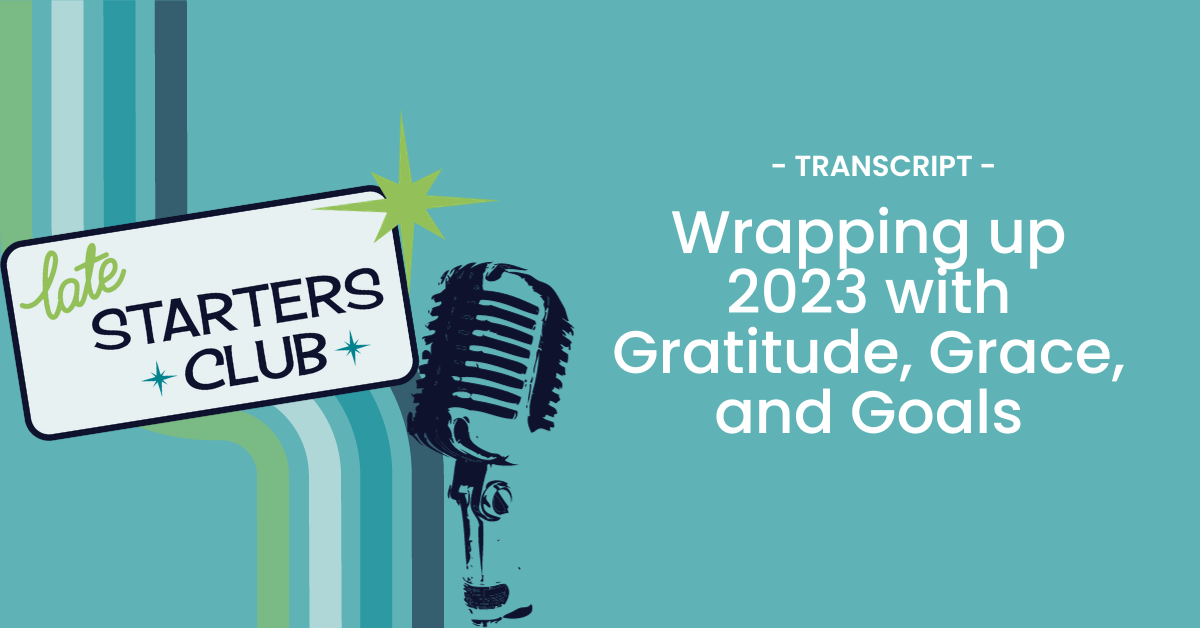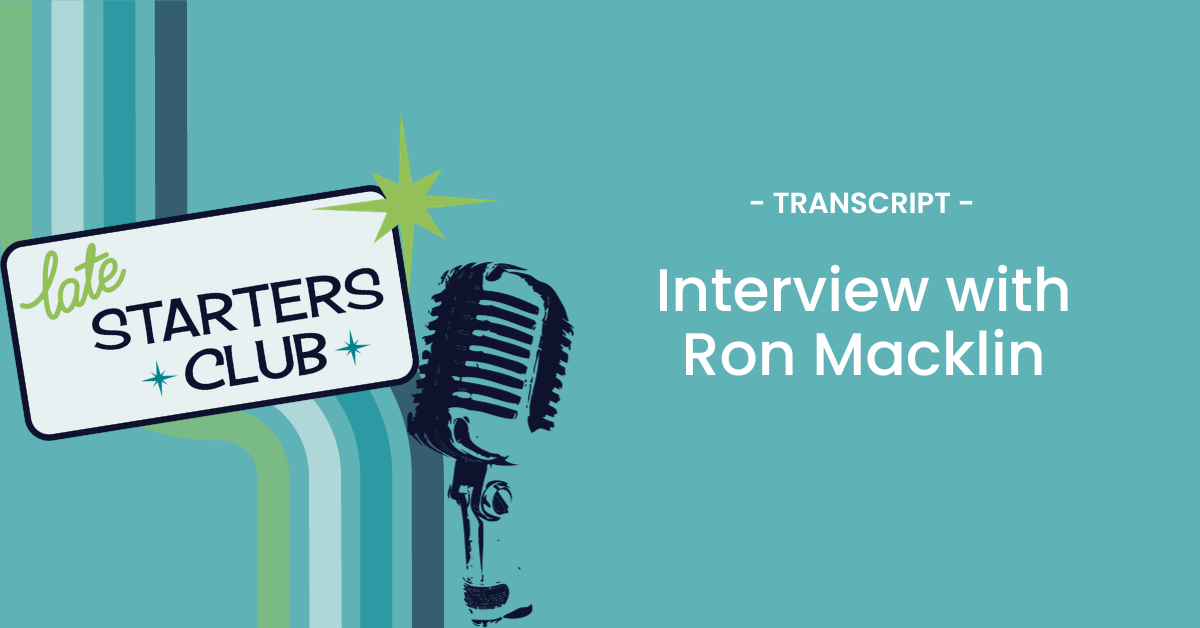Subscribe Apple | Google | Spotify | Stitcher | iHeart Living the Dream Overseas with Christine Gritmon Have you had a lifelong dream to live overseas and haven't made that happen yet? Maybe things have gotten in the way like family, jobs, life. My...
Ep170 Transcript: Finding New Motivation with Barry Karch

Finding New Motivation with Barry Karch
Andrea Vahl: It’s never too late to restart something you loved. My guest today, Barry Karch, started training for a marathon after a 20 year hiatus. And we’ll also dive into how he climbed the equivalent of Mount Everest in 36 hours in his sixties. Tune in.
Hello, dreamers. Welcome to the late starters club, giving you the inspiration, mindset, and tools you need to start something midlife and beyond remember, it’s never too late to follow your dreams.
Hey, late starters. It’s your host, Andrea Vahl. And I am here with Barry Karch, who has his first marathon in a long time coming up on Sunday. And I’m super excited to dive into all of that and talk about his journey with getting late restarted, restarting late and back into running. So welcome Barry.
Barry Karch: Hi, Andrea. Thank you so much for having me on your show. I love the concept of it. And I just think I’ve been a late starter in so many aspects of my life, but in, in running, as you mentioned, I’m a two time late starter. I didn’t really start running until my later thirties. And then I took a 20 year break and here I am again, getting restarted again.
Andrea Vahl: Yeah, that’s awesome. And so that’s a great message too. It’s never too late to restart something that you love doing before, right. to get back into it. You’re not too old, especially, I think people worry about like their knees or their, or just all the joints and everything like that. That’s awesome that you are getting going with that again.
And you actually have a whole podcast geared towards people running later in life called Running for your Life.
Barry finding the joy of running….again
Barry Karch: I do. You know what I found so much joy, so much more joy and running at this age than I did when I was younger. And so I wanted to share the joy and encourage other people that yes, you can do it and it’s never too late. And it’s actually better now than when you’re younger.
Andrea Vahl: So let’s dive into that a little bit. Why do you, why have you found more joy now than before?
Barry Karch: Well, Andrea, several reasons. First of all, I think when you’re younger, at least for me in my twenties, thirties, you take it for granted, you take your health for granted, you think running no big deal. I should be able to run or I should be healthy. But when you get a little older I’m in my sixties now, early sixties, a lot of people at this stage of life aren’t able to run due to health reasons or so forth, so I don’t take it for granted anymore.
Every time I go out and exercise, I am filled with gratitude. I’m just so thankful that I can do this. And just so happy on every run, no matter how good or bad the run is. It’s always great just to be able to do this. I just have a, I just always have a smile on my face. And when I get started out and I feel the fresh air against my face, I hear the birds chirping. I see the trees. I’m just filled with gratitude.
Andrea Vahl: Yeah. That’s awesome. And that’s such a great practice to have, right? It’s just being grateful and really appreciating our bodies and what they can do for us and what and just nature. I love running. It’s one of, it’s one of my favorite things in the world. And I had a hip injury for a long time and it, yeah, it was, it was really sad.
And so now I’m grateful that I’m able to run again and get out there.
Barry Karch: Oh, good. Good. Good. Glad to hear that.
Andrea Vahl: Yeah. So let’s talk about preventing injuries. I want to just talk about for people in our audience who maybe have given up running or maybe think that it’s too late for running.
Let’s talk about how you prepare yourself later in life for running and what you can do to stay as healthy as possible.
Staying Health-Running Smarter Not Harder
Barry Karch: Okay. Sure. Fortunately, I’ve never suffered a major injury. I’ve had lots of aches and pains and little things along the way, but I think one of the advantages about being older or starting later is hopefully, we’re not just older, but we’re wiser too. And I, I’ve learned from a lot of mistakes and I think I’m running a little stronger, a little smarter now than I used to.
When I ran, when I first started running, as I mentioned in my late thirties, early forties. I would do every run as a friend of mine used to call hardish. Every run, I pushed myself and never did anything easy. I was, felt like no pain, no gain. If I wasn’t like hurting, I wasn’t going hard enough or I was just too easy on myself.
So my legs would hurt. My knees would hurt after every run and I was only able to run, maybe two to three times a week. I needed a lot of breaks between runs to recover. Strange thing now that I’m older is I found that I’m counterintuitively more durable. I don’t get injured or sore aching like I used to.
I’ve been running five days a week now and I feel pretty good all the time. And I just think it’s cause smarter, I’ve gotten smarter. And what it is I do, I’ve learned how to vary the runs. I’ll do one long run a week. I’ll do one run we call speed work where I go at a higher intensity, but shorter duration.
And then my other three runs. Are what’s called, it sounds like an oxymoron to me almost, but it’s called a recovery run. Like, how do you recover while you’re running? But it’s called a recovery run, which is an easy, relaxed pace. That’s maybe a four out of four or five out of 10 effort, which I never used to do.
And so I’m enjoying those runs and that, and I’ve just, it’s enabled me to do more and get better without getting hurt.
Andrea Vahl: Yeah. Yeah. That’s great. That’s a great, you know, having a very, clear outline helps like, and , then you know what to expect, you know what you’re doing and everything like that. Now let’s talk about how that all fits into your marathon training. Is it just like then just extending those longer runs and, you know, and what provided that impetus to sign up for another marathon after such a long break?
Why Barry signed up for a marathon after 20 years away from running
Barry Karch: Okay well, I never expected to be doing a marathon again. This was not planned whatsoever. I ran eight marathons previously, the last one being exactly 20 years ago, and I just had enough. I was tired of constantly pushing myself and into the discomfort zone. I was always hurting physically and mentally it got tough to do it all the time and to look forward to it. So I just couldn’t do it anymore. And I took a long break. The problem was I kept eating like a marathoner. For the next 20 years. I love,
Andrea Vahl: to eat.
Barry Karch: I love pizza. I love pasta. I love chocolates. I love ice cream. I have a really horrible sweet tooth.
So I was still eating as if I was running a marathon without all the calories being burned off.
Andrea Vahl: Yeah. Still carb loading.
Barry Karch: Yeah, I did that for 20 years and I loaded on a lot of carbs. I loaded on about, I put on about 35 pounds over my marathon weight. And every time I went to the doctor, my weight was higher and higher.
I used to, when I was running a lot, I was around 150 ish pounds. Plus or minus a few, but I was around 150 and then after a few years of not running, I crossed the 160 threshold and then a few years later, I’m over 170 and then I’m over 180 and then I’m pushing 190 all of a sudden and it, I just kept asking myself, when are you going to do something about this weight and it never bothered me that much for a long time because I would just, I just rationalize that as well, I guess I’m enjoying the chocolate cake more than I’m enjoying more than the weight bothers me. So I just stayed the same until I think the big impetus was I finally crossed the 60 year old threshold and I told myself it’s now or never if you’re not going to do something now at this stage of your life to take control of your health and take off the weight.
It’s not going to happen. So I finally got serious about it and I changed my diet. I took out those carbs. I love so much for a year and all the weight started coming off. So I got back down to around one 50 again, and which was about my racing weight from 20 years ago. And I still, I never planned to run.
I never planned to run again. And one day my wife asked me, she just came out and asked me, are you going to try racing again? I haven’t really thought about that. I don’t know. And then I decided, okay, I guess I’ll do a 5k, which is 3.1 miles just to see what it’s like, and what I can do. And so I signed up for a 5k was I think a month or so down the road and I did it.
I did it without really training much. I was naturally considerably slower than I was 20 years ago.
But surprising to me, even without really putting much effort into it, I got first place in my age group, which is like, wow, how did that happen?
Andrea Vahl: Yeah. Yeah. Yeah.
Barry Karch: That was big wake up moment. That kind of got me inspired.
Like, maybe I should get back into running a little more and training a little more on this. So I started doing it. I started to get more serious about it and do some training and take on some bigger challenges. And I found, I love it. I found, I love it more now than when I was younger, just from the reasons from before.
Plus there’s less people as you get older that actually do the running and the racing. And so it’s just, it’s just I don’t know. I just love it.
Andrea Vahl: Yeah. It’s fun to compete and it’s definitely, yeah, you’re definitely in a smaller class. I found that too. I just, we just actually won first place in our age group of my, a team of mine at Camp Gladiator Games, you know, and I’ve never won anything in my life, never won anything in my life when we competed in this.
Barry Karch: That’s a good feeling.
Andrea Vahl: Yeah, it was so fun and so cool. And it was fun because it’s, it’s not at this stage, you know, we’re all the women competing, we’re all like, no injuries, you know, we’re all like, we’re all just, rooting for each other and it’s more good natured. It’s just fun.
Everyone’s out there for fun. And just to be healthy and appreciate what our bodies can do for us. So that’s great. That’s awesome. And so it’s so important because, you know, as we do age you know, added weight and strength and all of that stuff makes a difference in the quality of our life going forward.
Whereas I think when we were younger, your body could just bounce back a lot easier, but you know, as you get further and further, it does make a bigger and bigger difference to be able to have that strength, have good healthy habits, really clear out your mind and have good cardio capabilities.
It’s just, it’s huge. And I think that so many people would benefit from some activity, you know, making sure that you’re just doing something. So that’s great.
Barry Karch: Yeah, exactly. And it doesn’t have to be marathons or running, but just get active. You only have the one life, right? So you my goal is to live as long and healthy as I possibly can. So it just makes sense to take care of your body because without health, it’s a cliche, but you don’t have anything, nothing else matters.
Andrea Vahl: Yeah. Yeah. Exactly. So you’ve set this big, huge goal of this marathon coming up. How are you feeling? Ready? Are you excited?
Is Barry ready for the marathon
Barry Karch: I am excited. It’s been a kind of up and down four month training. I’ve had some struggles and I’ve had some really good runs and some not so good runs. Last week I was nervous, but this week it’s changed. I’m totally excited. I can’t wait to get to the starting line and get going.
Andrea Vahl: Yeah. Yeah. So how do you get through that when you’ve got some, you’ve had some bad runs, you know, you’ve like, how do you push through and kind of reframe some of those setbacks?
Barry Karch: You have to realize that not every run is going to be a good one, although it’s hard to, it’d be nice if everything went on an upward trajectory and you got better and better, no matter what it is you do, but that just doesn’t happen even in your career or whatever you have ups and downs.
That’s just life. So when things don’t go so well I had a lot of runs I struggle at, I had a hard time finishing. I was really discouraged. I had second thoughts about doing this. I just pushed myself to finish it anyways, even though I was going slower than I had hoped. And I tried to make positives out of the negatives.
I try to take a positive from every run. So I would think on a bad run, at least I had the determination to keep going and do it. And get it done despite not being at my best. I was mentally tough enough to get it done. Or I was telling myself this shows me how bad I want this. I still did it, even though I struggled.
So I just, I try to find a positive and frame a positive out of everything. And I would use the negative runs as motivation. Sometimes when I didn’t run as well as I wanted to the next time when I went out, I would have that in mind with a determination to do better.
Andrea Vahl: Yeah. Yeah. And that’s what’s, that is what’s important. It’s tough cause you’re like, I can’t, sometimes you feel like I can’t do this. There’s no way I’m going to be able to do this, you know. I can’t run 12 miles. How am I going to run 26? You know?
Barry Karch: Exactly. I felt that a lot along the way.
Andrea Vahl: Yeah. Yeah. Yeah. So that’s great. Just to take a lesson and keep at it and just say it’s going to be whatever it is going to be that day. So and the good thing is I always found that I did two marathons when I was younger and you’re now inspiring me, inspire me to think Oh, maybe I could do one now. But. Yeah, it’s just what I found was like a lot of times I’d have a really bad one and like the next one would, I’d feel great and I’m like, how can I just be like, feeling so energized the whole way, you know, and, and last time I, I was just sucking wind at mile six, you know.
Barry Karch: Yeah, it comes out of nowhere sometimes. Unexpectedly, all of a sudden you feel great. And you didn’t expect it, but it’s nice when that happens.
Andrea Vahl: Yeah. For sure. For sure. So what, you know, you’re setting, you’ve set this big, giant goal and you know, one of the things I know you talk about in your podcast is setting big goals. And so what do you think is the importance of having a big goal like this? Like why even do a marathon?
Why do a marathon and set big goals and Misogi
Barry Karch: I’m glad you asked that question. I came across this concept of a Misogi. About a year ago, what it is a Misogi is a Japanese concept. It’s all about having one big, scary, but exciting year defining goal. Something that you want to do that’s going to just energize you and capture your fancy. And you’re going to think about it all year and it makes the year memorable.
You’re like, you can think, oh yeah, 2023 was the year I did this or 2024 is a year I’m going to do that. It just makes a highlight of every year instead of the years just going by and you can’t remember. Whatever happened that year, what you did. So I’m from going here going forward again, a late starter on this too, is I plan to have a Misogi every year, a big, scary, year defining goal.
And it, by the way, it doesn’t have to be fitness. It doesn’t have to be an athletic challenge. It can be starting your own business. It can be getting married. It can be writing a book. It could be learning a new instrument. It could be something that excites you and scares you, but you really want to do and want to accomplish.
So make this the year that you do it. Actually the marathon is my second Misogi this year. I usually you do one, but I did my big, my really big Misogi in August. And it’s something that captured my fancy. It was a different type of. Endurance event that I never heard of in my life is called Two Nine Zero Two Nine.
Have you heard of it?
No,
Andrea Vahl: I’ve never heard of it.
Barry Karch: I’ve never heard of it. I don’t think many people probably have where the number comes from is twenty nine thousand and twenty nine feet to nine zero to nine is the height of Mount Everest.
Andrea Vahl: Yeah.
Barry Karch: I have never hiked a mountain in my life. Talk about being a late starter again.
And this event is all about hiking the equivalent vertical ascent of Mount Everest.
Without ever going to Mount Everest, it’s held in the US or Canada. They have 6 different locations in which there’s about 300 people in each event. You go to the mountain on a weekend. You have 36 hours to hike 29,029 feet.
That’s the goal. And you hike up the mountain, you take the gondola down. It’s not about going down. It’s only about the ascent hike up gondola down, up gondola down. Each mountain is different. I went to Snow Base in Utah and that particular mountain called for 13 ascents. So I hiked it up 13 times down.
The goal again is to achieve 29,029 foot vertical ascent to quote Everest, achieve the equivalent vertical ascent of Mount Everest. And I I went there in August, like I said, I never hiked a mountain in my life, so I just started doing that. Started training for it and it was awesome. It was a big challenge.
Had the best time and I’m happy to say I did accomplish the goal. I got it done. And I had the secondary goal of doing the marathon, which is coming up a couple of days from now, but that’s been my 2023. So I guess I found late in life. I never used to be like this. But I found late in my life.
And I think this is largely, I would call it a midlife crisis, except I guess I’m past midlife. I’m just trying,
Andrea Vahl: Who knows? You might
Barry Karch: maybe not, but I’m just,
Andrea Vahl: keep taking your vitamins.
Barry Karch: I know I have this strong desire. I have to prove to myself. I’m not old. I’m not old. I can still do this. So I’ve taken on all these tough challenges just to prove to myself.
I’m not old. So that’s where all this comes from all of a sudden. So that’s, that, that’s the motive. I think your question was the motivation to do the marathon. That’s where it comes from. I got to prove to myself, I’m not old. I can still do this. I’ve still got a lot more left in me.
Andrea Vahl: Yeah. And I think the, and you know, I think the benefit of the goals, like you were saying, like is, being memorable, but also just that thrill of accomplishment. And even if say you didn’t, you know, it’s, it can be challenged if you didn’t finish or didn’t achieve the 29,000 feet, whatever.
But you still out there. It’s about that journey. And I think, at this point in our lives, we’re recognizing the beauty of the journey in some, in such, you know, more powerful ways that we’re really appreciating you know, the ways we can push ourselves and feel life and live life to the fullest.
Because it is just like about experiences, and having that, unique experience, that is a cool challenge. So how did you train for that? Do you, did you just go on lots of hikes or did you train at night or, you know?
Training for 2-9-0-2-9 Challenge
Barry Karch: Part of when you sign up for this challenge, they provide you with a 20 week training program. And so I followed the program. It had hiking in it. Yes. Which is a little hard for me to do. Cause I’m not in a mountainous area. I did the best I could with what’s here. I found some people. In my general area who were registered for the same challenge I hooked up with them and we did some hiking together and a lot of it was running to it was just to build the endurance and the leg strain.
And then some of it was on treadmill. I did treadmill with 20, 30 percent inclines on it used to that, but yeah, but that’s how I trained for it. But I love what you just said too, about the journey. And that is one of the things. That I found to be so different about doing this now is when I was younger, when I was younger, I didn’t really like the journey.
I didn’t appreciate the journey. I just couldn’t wait for the event itself. But I felt like the journey was a pain or Troy had to get through. Now I’ve come to look like the journey as much or more than the actual event. I love the training. I’ve come to love training. I’ve loved to you. I’ve made a lot of connections along the way that other people doing the same things.
I’ve just thoroughly enjoyed it and just building the strength, building the memories doing it. I think that is so important is to enjoy every day and every step of the way along the process.
Andrea Vahl: Yeah. Yeah. That’s awesome. That is cool. So then did you have to, during this, did you sleep at all during the sleep on the gondola down? How did you do that?
Barry Karch: You have the 36 hours to use as you wish. So the first day, the event starts at 6 a. m. And my, I knew I had to get 13 ascents again to complete my event. I knew in my head I needed to get nine or 10 the first day because the second day goes to 6 p. m. And it’s over. I knew I had to get nine or 10 done the first day.
To be in a reasonable position to get accomplished the goal. So I was doing ascent number nine and I was trying to decide it was getting close to midnight. I started at 6 AM. It was almost midnight. I’ve been going what is that? An 18 hour day of hiking that I did take breaks for meals. But I was really tired.
Getting spent, I was trying to decide, do I want to do number 10? It’s going to take me to after 2 a. m.
Or do I want to call it a day and sleep? And I decided I would try to get some sleep after at midnight after number nine, because I felt like if I did 10 and it took me, if I did it, if it took me to 2, 2:30 a.m. I was going to have to delay the start the next day that much later, so I wasn’t really going to accomplish anything positive. I feel like I feel fresher the next day if I get a little sleep. So after at midnight, after number nine, I went back to my, we were staying in tents on this event.
Andrea Vahl: Yeah. Yeah.
Barry Karch: I went back to my tent and I tried to get some sleep.
It’s hard because you’re so keyed up,
you know,
I might’ve slept, I laid in bed about four hours. I might’ve slept maybe two hours and I’m just laying there and I’m not sleeping anymore. I’m thinking there’s no point just laying here in bed, not sleeping. So I got up and had breakfast and I was back at it before 6am again the next day.
Andrea Vahl: Yeah. Wow. That is so cool. Love that. That’s awesome. Yeah. How fun, what a huge goal to accomplish did you just was, were you just flying after that? Were you, so excited to, to meet that goal?
Barry describes his feelings of meeting his Misogi
Barry Karch: I was. It sounds, it might sound crazy, but I was so obsessed by this challenge for over a year before I, before the day came, because I’d heard about it. I couldn’t get on my mind. Can I do this? Because again, I never hiked. I just totally obsessed by it. And so when I actually, when the day came, I actually drove up to the mountain. I saw the banners out there. I actually had tears in my eyes. I was all choked up. Like it’s here. I can’t believe it was actually the day. But when I got there, I was very determined. I know myself I am super driven and if I didn’t accomplish it, I was going to be very upset.
Probably have to come back again the next year and try it again. And I just was. Determined to do it. So I just pushed and it was hard, but I just kept doing it. And when I finally got there, it was a mixture of elation and relief to be done with it.
Andrea Vahl: Yeah. Yeah. thAt, that is really cool. And congratulations on that and that, and then hopefully everything will go amazingly well on the marathon this weekend. So that sounds. That sounds great too. And I’m glad you’re feeling ready. And again I think it’s just such a great attitude to say it’s about the journey.
Cause we, there’s so many things we can’t control on the day of and, you know, so that’s awesome. So Barry, this has been so fun. As usual, I do like to always. Check and find it. I’m such a quote junkie. I love to ask my guests their favorite motivational or inspirational quote to share with our listeners.
Favorite Motivational Quote
Barry Karch: My new favorite quote, and this is actually coming from one of the founders of 29029. He says, Remember tomorrow. And what do you mean? That’s the quote. Short and sweet. What he means by that is how are you going to think of yourself and your effort tomorrow? If you quit today, remember tomorrow, what are you gonna be thinking about this?
Yes, it’s getting tough now. Yes, it’s super hard. Yes, you hurt. But remember tomorrow uh, a few more moments or minutes of agony or pain is going to be so worth it because tomorrow you’re going to look back and be so thrilled that you pushed through it and you accomplished your goal and did it. So always remember tomorrow.
Andrea Vahl: Yeah. I love that. That is so cool. I love that whole idea because it is really there’s so much that you get out of. The, you know, the pride and the joy of having accomplished a big goal like that. And to have that ability to think ahead and say, you know what, I think that if I stopped right now, I might regret it tomorrow, you know, and you don’t want that.
So that is That is awesome. That is a great quote. And thank you so much.
Connect with Barry
And share where people can find you online. Share your podcast and we’ll have all the links in the show notes here, but where can people connect with you?
Barry Karch: Okay. They can connect with me on Instagram or Facebook under my name, Barry Karch or the podcast Running For Your Life, which is available. And pretty much all podcast platforms, wherever you listen to them.
Andrea Vahl: Thank you, Barry, for your time and good luck on Sunday. I’m so excited for you. Just let me know how it goes.
Barry Karch: Okay. Thank you so much. I really enjoyed it. Thanks for having me.
Andrea Vahl: Thanks. Bye everyone.
Hope that was helpful and make sure you grab the free guide top tools for late starters on the website at late starters club. com and let’s turn dreaming into
Join the conversation.
Let us know what you think about this episode.
Never miss an episode.
Subscribe to the podcast
You may also enjoy…

Ep169 Transcript: Questions to Kick Start 2024
Andrea Vahl: Oh, happy new year. Yeehaw. 2024. All right. I don't know about you, but I love planning out my year and setting goals and really reflecting on how my past year went and being super intentional about what I want the next year to look like. In today's...

Ep168 Transcript: Wrapping up 2023 with Gratitude, Grace, and Goals
Hello, late starters. It's your host, Andrea Vahl And today is Christmas day. And if you do celebrate that Merry Christmas, if you celebrate some other holiday, I wish you all the best and all the joy for that. I just wanted to make a different episode. So today we're...

Ep167 Transcript: Interview with Ron Macklin
Andrea_Vahl: How do you go from an engineer working on nuclear power plant engines to starting a business, launching a bestselling book and starting a podcast? Well, my guest today did just that. Tune in to today's episode where I interview Ron Macklin. Hello,...


0 Comments